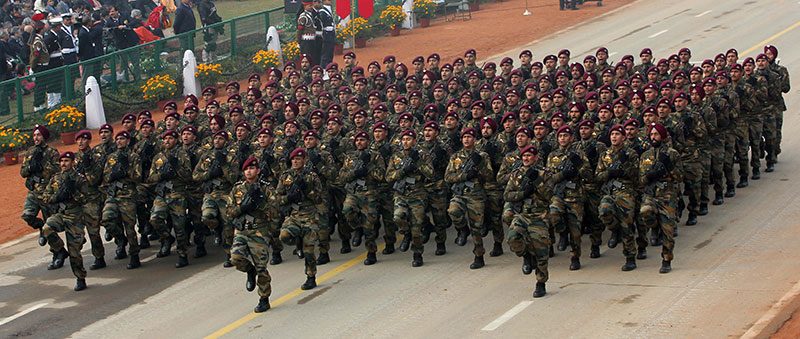Army to Raise Additional Five Battalions of Para SF
The Army plans to raise an additional five battalions of para Special Forces (SF) by the end of the 10th Army plan (2002 to 2007). The conversion of two para battalions into SF (4 para followed by 3 para) will be completed by 2005. Expected allocation will be two para SF battalions each to formations actively engaged in CT operations and deployed in high altitude areas. Southern and Eastern commands would need a unit each, while the Army Headquarters should keep a couple of battalions as reserves. There is also a thinking that at least one para SF battalion should have an integral air lift capability. At present there are five para SF battalions and five para battalions under the 50 Independent Para Brigade. Once the raisings are completed there will be more para SF battalions than para battalions implying a change of course in the use of parachute elements.
Also Read:
The Maroon Beret
Keeping up with posting one archival article a week, here is a nugget from January 2004, when FORCE visited Indian Army’s training school for Special Forces in Nahan. The first-ever comprehensive feature that covered the training as well as the transition of the Para battalions into Special Forces. 15 years later, the issues that FORCE raised then remain. Read on
State-of-the-art equipment for para SF battalions is coming from Israel and the United States. A total of 40 equipment and weapons items have been identified of which 26 will come from the US and the remaining from Israel and Russia. The equipment from Israel includes personal weapons like Tavor assault rifles and Galil sniper rifles. From the US, the Army has sought equipment which is presently in use with their Special Operations Forces. The equipment from Israel has already come while that from the US is under negotiation. If the US agrees to give the equipment through the Foreign Military Sales route, the delivery is expected to be completed by December 2004. If the trial route is adopted, the equipment from the US will come only by May 2005. Israel is seeking to take advantage of this time lag for procurements from the US and is trying to hard-sell its additional equipment to the Army. This partly explains the increased visits of Israeli defence delegations to New Delhi.
While the Cabinet Committee on Security cleared Rs 5 billion for new equipment for para SF in June 2002 and assured additional funds for this force, it has yet to approve the revised Weapon and Equipment (WE) list of the para SF. Once the WE is accepted by the government, procurements would be easy. Moreover, the para SF would have the new equipment permanently, and not as a one-time addition to the existing one. The defence minister, George Fernandes has accorded permission to modernise the para SF at the earliest, and has, in principle, accepted the need for separate annual funds for this force.
Intense deliberations are on at the Army Headquarters and the Army Training Command at Shimla to review the para SF organisation, training, recruitment, roles and missions and eventually to give them a doctrine to meet the new military challenges. The oft asked question of whether the para SF should be separated from the para regiment has been settled. According to a top general, “Even as we build the para SF capabilities, some battalions of the para regiment will continue to be maintained.” Meanwhile, to bring standardisation in training on the new equipment, and to develop the collective ethos of the para SF, the basic para SF training will be conducted at the Special Forces Training School (SFTS) in Nahan from January 1, 2004. At present, the basic SF training is done at the unit level, while the SFTS caters for the advanced training.
Also Read:
The XYZ of Special Operations
Searching for an Indian Role for Special Operations Forces (SOF)
Also Read:
Weapons of Choice
Even as the new equipment for the para SF is meant to replace the existing vintage lot the bulk of it is for operations in hostile territory.
Also Read:
US Special Operations Forces
Special operations forces are playing a key role in the Iraq conflict, albeit a covert one given the secretive nature of these units.


